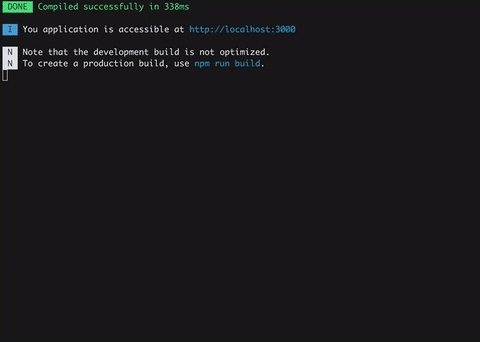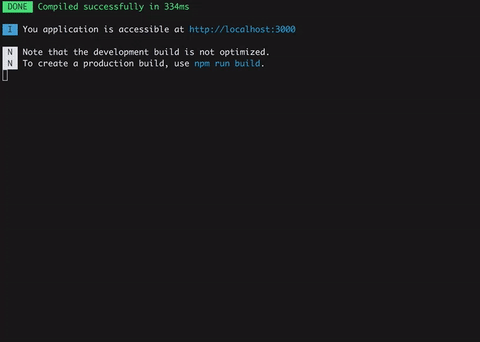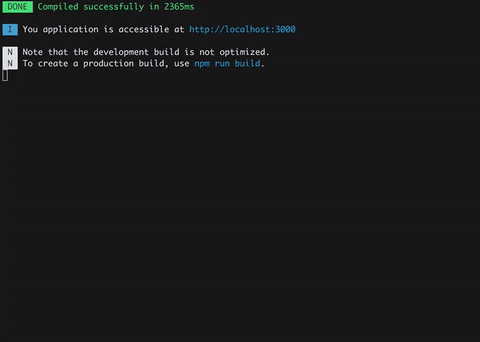|
|
- # Friendly-errors-webpack-plugin
-
- [](https://www.npmjs.com/package/friendly-errors-webpack-plugin)
- [](https://travis-ci.org/geowarin/friendly-errors-webpack-plugin)
- [](https://ci.appveyor.com/project/geowarin/friendly-errors-webpack-plugin/branch/master)
-
- Friendly-errors-webpack-plugin recognizes certain classes of webpack
- errors and cleans, aggregates and prioritizes them to provide a better
- Developer Experience.
-
- It is easy to add types of errors so if you would like to see more
- errors get handled, please open a [PR](https://help.github.com/articles/creating-a-pull-request/)!
-
- ## Getting started
-
- ### Installation
-
- ```bash
- npm install friendly-errors-webpack-plugin --save-dev
- ```
-
- ### Basic usage
-
- Simply add `FriendlyErrorsWebpackPlugin` to the plugin section in your Webpack config.
-
- ```javascript
- var FriendlyErrorsWebpackPlugin = require('friendly-errors-webpack-plugin');
-
- var webpackConfig = {
- // ...
- plugins: [
- new FriendlyErrorsWebpackPlugin(),
- ],
- // ...
- }
- ```
-
- ### Turn off errors
-
- You need to turn off all error logging by setting your webpack config quiet option to true.
-
- ```javascript
- app.use(require('webpack-dev-middleware')(compiler, {
- quiet: true,
- publicPath: config.output.publicPath,
- }));
- ```
-
- If you use the webpack-dev-server, there is a setting in webpack's ```devServer``` options:
-
- ```javascript
- // webpack config root
- {
- // ...
- devServer: {
- // ...
- quiet: true,
- // ...
- },
- // ...
- }
- ```
-
- If you use webpack-hot-middleware, that is done by setting the log option to `false`. You can do something sort of like this, depending upon your setup:
-
- ```javascript
- app.use(require('webpack-hot-middleware')(compiler, {
- log: false
- }));
- ```
-
- _Thanks to [webpack-dashboard](https://github.com/FormidableLabs/webpack-dashboard) for this piece of info._
-
- ## Demo
-
- ### Build success
-
- 
-
- ### eslint-loader errors
-
- 
-
- ### babel-loader syntax errors
-
- 
-
- ### Module not found
-
- 
-
- ## Options
-
- You can pass options to the plugin:
-
- ```js
- new FriendlyErrorsPlugin({
- compilationSuccessInfo: {
- messages: ['You application is running here http://localhost:3000'],
- notes: ['Some additionnal notes to be displayed unpon successful compilation']
- },
- onErrors: function (severity, errors) {
- // You can listen to errors transformed and prioritized by the plugin
- // severity can be 'error' or 'warning'
- },
- // should the console be cleared between each compilation?
- // default is true
- clearConsole: true,
-
- // add formatters and transformers (see below)
- additionalFormatters: [],
- additionalTransformers: []
- })
- ```
-
- ## Adding desktop notifications
-
- The plugin has no native support for desktop notifications but it is easy
- to add them thanks to [node-notifier](https://www.npmjs.com/package/node-notifier) for instance.
-
- ```js
- var NotifierPlugin = require('friendly-errors-webpack-plugin');
- var notifier = require('node-notifier');
- var ICON = path.join(__dirname, 'icon.png');
-
- new NotifierPlugin({
- onErrors: (severity, errors) => {
- if (severity !== 'error') {
- return;
- }
- const error = errors[0];
- notifier.notify({
- title: "Webpack error",
- message: severity + ': ' + error.name,
- subtitle: error.file || '',
- icon: ICON
- });
- }
- })
- ]
- ```
-
- ## API
-
- ### Transformers and formatters
-
- Webpack's errors processing, is done in four phases:
-
- 1. Extract relevant info from webpack errors. This is done by the plugin [here](https://github.com/geowarin/friendly-errors-webpack-plugin/blob/master/src/core/extractWebpackError.js)
- 2. Apply transformers to all errors to identify and annotate well know errors and give them a priority
- 3. Get only top priority error or top priority warnings if no errors are thrown
- 4. Apply formatters to all annotated errors
-
- You can add transformers and formatters. Please see [transformErrors](https://github.com/geowarin/friendly-errors-webpack-plugin/blob/master/src/core/transformErrors.js),
- and [formatErrors](https://github.com/geowarin/friendly-errors-webpack-plugin/blob/master/src/core/formatErrors.js)
- in the source code and take a look a the [default transformers](https://github.com/geowarin/friendly-errors-webpack-plugin/tree/master/src/transformers)
- and the [default formatters](https://github.com/geowarin/friendly-errors-webpack-plugin/tree/master/src/formatters).
-
- ## TODO
-
- - [x] Make it compatible with node 4
-
|
